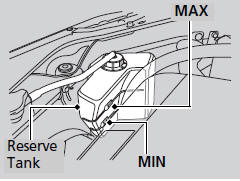Overheating
How to Handle Overheating
Overheating symptoms are as follows:
• The temperature gauge needle is at
 the mark or the engine suddenly
loses
power.
the mark or the engine suddenly
loses
power.
• Steam is coming out of the engine compartment.
■ First thing to do
1. Immediately park the vehicle in a safe place.
2. Turn off all accessories and turn on the hazard warning lights.
- No steam or spray present: Keep the engine running and open the hood.
- Steam or spray is present: Turn off the engine and wait until it
subsides.
Then open the hood.
WARNING
Steam and spray from an overheated engine can seriously scald you.
Do not open the hood if steam is coming out.
NOTICE
Continuing to drive with the temperature gauge
needle at the mark may damage
the engine.
mark may damage
the engine.
■ Next thing to do

1. Check that the cooling fan is operating and
stop the engine once the temperature
gauge needle comes down.
- If the cooling fan is not operating,
immediately stop the engine.
2. Once the engine has cooled down, inspect
the coolant level and check the coolant
system components for leaks.
- If the coolant level in the reserve tank is
low, add coolant until it reaches the
MAX mark.
- If there is no coolant in the reserve tank,
check that the radiator is cool. Cover the
radiator cap with a heavy cloth and open
the cap. If necessary, add coolant up to
the base of the filler neck, and put the
cap back on.
■ Last thing to do
Once the engine has cooled sufficiently, restart it and check the temperature
gauge.
If the temperature needle has gone down, resume driving. If it has not gone down, contact a dealer for repairs.
WARNING
Removing the radiator cap while the engine is hot can cause the coolant to spray out, seriously scalding you.
Always let the engine and radiator cool Reserve down before removing the radiator cap.
If the coolant is leaking, contact a dealer for repairs.
Use water as an emergency/temporary measure only.
Have a dealer flush the system with proper antifreeze as soon as possible.
See also:
If the EPS System Indicator Comes On
6-cylinder models
■ Reasons for the indicator to come on
• Comes on when there is a problem with EPS system.
• If you depress the accelerator pedal repeatedly to increase the engine
sp ...
Playing an iPod (EX-L model with navigation system)
Playing an iPod (EX-L model with navigation system)
To Play an iPod
This audio system can select and play the audio files on the iPod with the same
controls used for the indash disc player. To p ...
Lights
Light Control Switches
...






